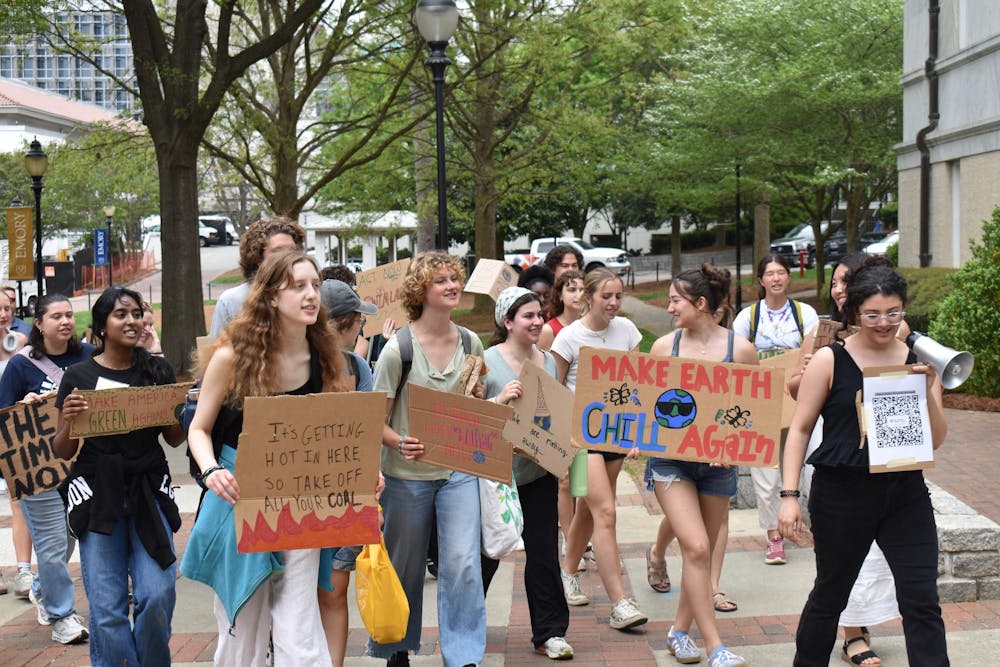Smoke billowed out of the exhaust pipes of three food trucks in Asbury Circle as Emory Climate Reality Project (ECRP) members stood in front of Dobbs Hall at 1 p.m. on April 4. This is the first climate strike ECRP has held since September 2023.
ECRP is a nonpartisan group at Emory University focused on climate activism and encouraging the University to meet climate-related goals.
Around 25 students, including members of Emory Students for Socialism and the Emory Sunrise Movement, an organization which seeks to limit fossil fuel usage, listened to ECRP Climate Action Chair Sarah Orozco (25C) and Emory Students for Socialism co-President Zachary Hammond (23Ox, 25C) speak about recent actions from the Trump administration regarding climate change efforts.
“We can end the role of billionaires who have destroyed our climate and buy our politicians into inaction,” Hammond said. “A better, greener future is possible, but it is not inevitable. It’s up to us to become politically involved and organized.”
Following the pair’s initial remarks, the group marched from outside of the Emory University Student Center to the Quadrangle, chanting in resistance toward U.S. President Donald Trump and his administration’s policies.
“Climate change has got to go,” the group chanted. “Elon Musk has got to go.”
When the protestors reached Convocation Hall around 1:30 p.m., Orozco highlighted the purpose of their location.
“Whose office is in Convocation Hall?” Orozco asked.
The crowd replied with a call of “Greg Fenves” before proceeding to boo.
Emory Sunrise Movement member Ava Trachtenberg (28C) spoke to the crowd about her experience in local climate advocacy. The previous week, Trachtenberg and 15 other students visited the Georgia Public Service Commission (GPSC), where she said they spoke the “truth” of environmental issues to the commission’s audience of lawyers and elected representatives. The GPSC institutes rules and regulations for services located in Georgia. Trachtenberg said local and municipal climate reforms lead the way for national change.
“Not only is the local level where the decisions get made, but this is where we have power and when we show up in numbers, we can make a difference,” Trachtenberg said. “That means we can change what happens, and that has an impact across the state and across the country. When we show up, it matters.”
Orozco followed Trachtenberg by reading a list of organizers' demands for University administration. These demands included the University reaching net-zero greenhouse gas emissions by 2050 and joining the America Is All In coalition, which unites universities, businesses and other organizations nationwide seeking climate justice.
ECRP Director of Community Outreach Anna Sabol (28C) spoke about issues regarding climate action at Emory. She mentioned past controversy with Emory’s previous recycling vendor, carbon emissions, and the transition to a “fully green campus” as a few priorities for which Emory administrators should be held accountable.
“A big thing that Emory could work on, or continue to do, is be transparent with their student body,” Sabol said.
Emory has made some reforms this year related to the environment. The University signed a new contract with Waste Eliminator to increase landfill diversion rates.
After the protest, participants mentioned feeling optimistic, even in the face of challenges to climate change action by federal government funding cuts from the Trump administration.
Carter Douglas-Brown (27C) and Janel Huseynova (28C) reflected on the recent advocacy efforts by Emory Sunrise Movement and spoke about how the Emory administration can play a role in fighting back against the Trump administration’s funding cuts.
“I feel like it was a major setback for us, but we have the ability to do something as students,” Huseynova said. “We are a large research institution, so we do have power if we come together.”
Douglas-Brown echoed her sentiments, drawing on her background as a Georgia resident who sees the influence Emory can have on the Atlanta area.
“Being from Georgia, I feel like a lot of people view Emory as a real driver of change, pioneers in, at least, the Atlanta community,” Douglas-Brown said. “We need to crank up the volume, crank up the temperature and just go even harder and just be that leader and hope that people will follow.”

Ellie Fivas (she/her) (26C) is from Cleveland, Tenn., and is majoring in political science and history on the pre-law track. She manages the Wheel’s opinion section and the Editorial Board. When she is not writing for her political column Electoral Ellie, she works in prison education, leads a human rights club and works at the Emory Writing Center. In her free time, you can find her reading trashy romances and The New York Times, basking on the Quadrangle and doing crossword puzzles.

Jacob Muscolino (he/him) (28C) is a News Editor at The Emory Wheel. He is from Long Island and plans to major in History and Psychology. Outside of the Wheel, he is involved in Emory Reads and Emory Economics Review. You can often find Jacob watching the newest blockbuster for his Letterboxd, dissecting The New York Times and traveling to the next destination on his bucket list.









